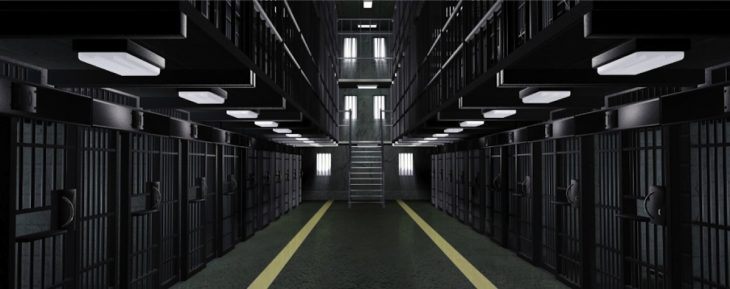Parole Board denies clemency for death-row inmate, state’s fifth 2017 execution still on schedule for Nov. 9
by October 5, 2017 4:42 pm 509 views

After the Arkansas Parole board voted Thursday (Oct. 5) to deny clemency for death-row inmate Jack Greene, state Department of Correction (ADC) officials said everything is still on target for the fifth Arkansas prisoner to enter the death chamber just over a month from now.
“Until instructed otherwise, the department is preparing to carry out the sentence as directed by Gov. (Asa) Hutchinson,” ADC spokesman Solomon Graves told Talk Business & Politics.
On Aug. 25, Gov. Hutchinson scheduled Greene’s death by lethal injection on Nov. 9 after Arkansas Attorney General Leslie Rutledge requested an execution date be set for the longtime death-row inmate convicted of capital murder on Oct. 15, 1993.
On the same day, Hutchinson granted clemency to former death row inmate Jason McGehee after the Parole Board earlier recommended that his death sentence be changed from death to life in prison with parole. Federal Defender Scott Braden said Thursday the Parole Board should have granted the same mercy to the Greene, who he said is severely mental ill.
“This mental illness causes Mr. Greene to have delusions about a conspiracy to injure him, as even Arkansas Department of Correction staff have recognized,” Braden said. “These delusions so cloud Mr. Greene’s thinking that, as a psychiatrist has determined, he does not rationally understand his execution. An execution of that nature would not be humane and it would not serve the purposes of punishment. It would merely be a miserable spectacle.”
Braden said he would seek a competency hearing through the courts to prove Greene is incompetent, making his execution unconstitutional. “We respectfully ask the Governor to grant clemency in this unique case,” he said.
In late April, national attention was centered on the ADC’s Cummins Unit in Varner after Hutchinson had proposed to execute eight inmates, a move without precedent in U.S. legal history. However, Jason McGehee, Don Davis, Bruce Ward and Stacey Johnson all had their executions postponed due to stays or injunctions filed by different courts.
With less than a month before his scheduled execution date, Greene will either be the fifth Arkansas inmate to die by lethal injection or the fifth prisoner to have his death sentence postponed. Just last week, the Arkansas Supreme Court stopped a ruling by Pulaski County Circuit Court Judge Mackie Pierce that the legislature could not shield information about the drugs used to carry out executions.
Since Arkansas put itself at the center of the national debate on the death penalty this spring, keeping a supply of drugs for executions has proven a challenge because pharmaceutical manufacturers do not wish to be associated with the death penalty for moral or public relations reasons.
On Aug. 4, Solomon said ADC officials had acquired a new supply of midazolam, the controversial sedative that has been at the center of recent court hearings concerning botched executions in Oklahoma and other states.
According to a receipt obtained through a Freedom of Information Act request by Greene’s attorney, ADC Director Wendy Kelley purchased a new supply for $250. The name of the supplier was redacted in keeping with state law passed two years ago that allows ADC officials to keep secret the information about the manufacturer, supplier and other details of drugs to execute death-row inmates.
In May, state correction officials announced they had obtained a new supply of potassium chloride and would proceed with Gov. Hutchinson’s execution schedule unless there was a stay by state or federal courts. The potassium chloride, which stops the heart and is the third drug in a cocktail used in executions, had expired.
Vecuronium bromide, a muscle relaxant that cause paralysis, is the third drug used in ADC’s execution protocol. In April, Pulaski County Judge Wendell Griffen blocked the state from using vecuronium bromide after several pharmaceutical companies filed briefs questioning how Arkansas obtained their lethal injection drugs.
The Arkansas Supreme Court also vacated a decision by Pulaski County Judge Wendell Griffen after the lower court judge took part in an anti-death penalty rally ahead of the state’s speedy execution schedule.
Last’s week one-page ruling by the state Supreme Court to block Pierce’s court order included a note by Chief Justice Dan Kemp that he would have denied Rutledge’s request for a stay. The high court also granted the plaintiff’s request to expedite the Correction Department’s and Rutledge’s appeal of the lower court order before Greene’s execution in the second week of November.
Greene was convicted for the 1991 murder of 69-year old Sidney Burnett, a preacher living in Knoxville in Johnson County. According to court reports and media accounts, Greene tortured, stabbed and shot Burnett for helping his ex-girlfriend who was trying to escape from Greene’s abuse. Before killing Burnett, Greene had traveled the week before to North Carolina and shot and killed his brother, Tommy Greene.
